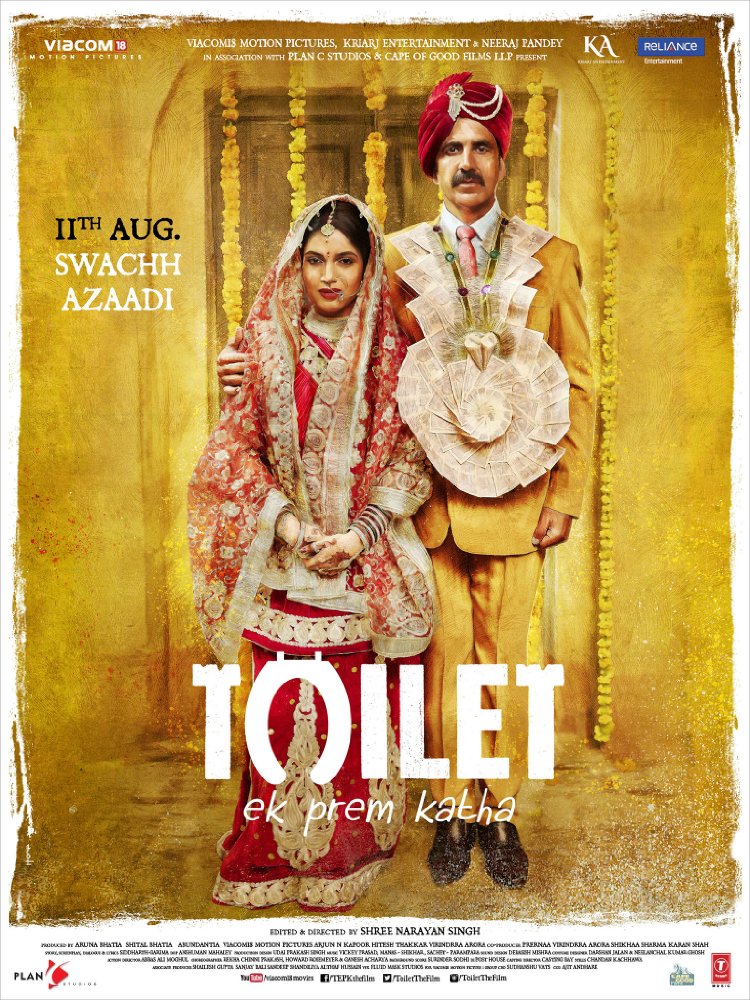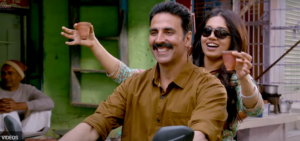
Bollywood Film Review “Toilet: Ek Prem Katha”
WATCH THE TRAILER HERE
First, the Recap:
Obligation. Necessity. Inevitability. Terms signaling change, needed transformation, applied to any myriad of circumstances where inconvenience or other instability has determined a need for action in order that restoration and progress can emerge. All that’s left is for those who would stand and fight for it be heard. In neighboring villages near Mathura, two souls are about to collide in the form of Keshav (Akshay Kumar), a straightforward man whose thoughts on marriage have been amplified due to his age, and Jaya (Bhumi Pednekar), a younger woman of education and strong-willed principals. Despite her ongoing, but playful, avoidance of Keshav’s advances upon first meeting him, Jaya soon falls for the affable man, and the two marry.
However, in an unexpected turn of situations, the union hits immediate rocky ground when Jaya comes to the realization Keshav has no in-home toilet, instead having to experience joining the other local wives in their pre-dawn ritual out in the nearby fields. Completely horrified by the concept, Jaya soon makes Keshav’s home life, and the lives of his friend Naru (Divyendu Sharma) and father Bauji (Sudhir Pandey) a living hell, ultimately threatening divorce if Keshav cannot find the means to build a toilet. Going against age-old cultural traditions and values in India, Keshav sets out to campaign against all odds in order to see his wife’s, and then his, vision come to pass. Will it be successful when going against family, his village, and an entire nation?
Next, my Mind:
Filled with biting, satirical comedy along with the engaging mix of solid drama and whimsical love story, director Shree Narayan Singh brings this taste of Indian cultural heritage to life, within the context of fictional characters and presentation, in order to pay homage to current Indian PM Narendra Modi’s heralded Swachh Bharat Abhiyan campaign that steers towards ideas about cleanliness and eradication of open defecation in rural areas. Treating its rather unsanitary subject with wonderfully written infusions of humor and dramatic depth, the narrative moves at a brisk pacing while allowing its underlying intention or themes to not overshadow the love story of Keshav and Jaya. As a Western reviewer, I admit fully understanding Jaya’s severe uneasiness about the lack of a loo in the couple’s home yet also comprehending Keshav’s lack of initial understanding at her shock when this has been the ways of things since he can remember. Having to stand up and defy tradition is a heavy matter, and the film does a superb job at capturing this dynamic occurring between the leads without being overtly melodramatic. It’s a relevant cultural story to share in this modern age, as Modi’s cleanliness initiative shows.
Kumar just keeps nailing every role he takes on with a winning smile, intensity, and dramatic flare. Here as Keshav, this continues his streak, playing the character as a happy-go-lucky but still frustrated guy who’s desire to get married alone causes a stir in his home village. Watching as he relentlessly pursues Jaya is both endearing and innocent, but also seeing his true dedication to her in a willingness to go against everything he’s ever known in order to see her happy and to initiate hard-fought change to an entire country is given with equal passion and fire, a tribute to Kumar’s prowess as an actor and the relatability he provides. Pednekar firmly stands toe to toe with Kumar, however, as his beloved wife Jaya, a woman brought up educated and independent, who’s also used to having an in-home loo at her disposal. Seeing her blatant indignation and steadfast willfulness to not have to degrade herself by going to the fields like the village’s other women is a potent statement, especially given the ever-divided concepts of social equality still being fought for by the women of India, and its refreshing to see how eloquently and fervently Pednekar delivers this role, more so as a relative new-comer to the industry.
Sharma as Keshav’s friend Naru is a treat, very much in support of his pal yet often wavering in the face of true conflict. This actually adds some additional humor to the proceedings via his interactions with Keshav. Pandey as Keshav’s father Bauji is also a study in contrasting moods and attitudes once his son chooses the path far less traveled in upsets the status quo in the village, much less the family name. It’s a riot, though, to view Bauji’s humorous and impactful when seeing his serious sides throughout. Additional support comes from Rajesh Sharma, Mukesh Bhatt, Anupam Kher, and Sana Khaan among others. In total, “Toilet: Ek Prem Katha” certainly stands as a bold, honest, blatant statement about the conditions that still exist in India, a stab at the politicians who’ve allowed the country to fall into such unhealthy states, and perhaps a further rallying cry for necessary redefining, reshaping, and transfiguration of its society.
As always, this is all for your consideration and comment. Until next time, thank you for reading!




